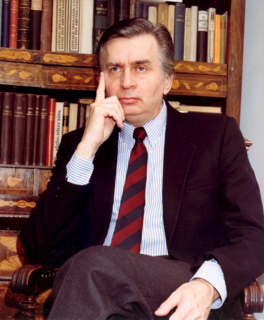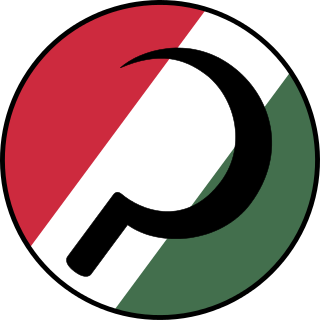
The Hungarian Workers' Party is a communist party in Hungary led by Gyula Thürmer. Established after the fall of the communist Hungarian People's Republic, the party has yet to win a seat in the Hungarian parliament. Until May 2009 it was a member of the Party of the European Left.

Parliamentary elections were held in Greece on 19 August 1928. The result was a victory for the Liberal Party, which won 178 of the 250 seats.

Parliamentary elections were held in Hungary on 10 May 1998, with a second round of voting in 175 of the 176 single member constituencies on 24 May.

The 1990 Hungarian parliamentary elections were held in Hungary on 25 March 1990, with a second round of voting taking place in all but five single member constituencies on 8 April. They were the first completely free and competitive elections to be held in the country since 1945, and only the second free elections in the country's history. The conservative, nationalist Hungarian Democratic Forum (MDF) beat the liberal and more internationalist Alliance of Free Democrats, which had spearheaded opposition to Communist rule in 1989, to become the largest party in parliament. The Hungarian Socialist Party, the former Communist party, suffered a crushing defeat, winning only 33 seats for fourth place.

Parliamentary elections were held in Hungary on 8 May 1994, with a second round of voting in 174 of the 176 single member constituencies on 29 May. They resulted in the return to power of the Hungarian Socialist Party, the former Communist party, under the leadership of Gyula Horn, who became Prime Minister. The Socialists achieved a remarkable revival, winning an overall majority of 209 seats out of 386, up from 33 in 1990. At the time, it was the most seats that a Hungarian party had ever won in a free election.

The Civic Democratic Party was a liberal political party in Hungary in the period following World War II

Parliamentary elections were held in Hungary on 15 May 1949. The Hungarian Independent People's Front, an umbrella group created that February to replace the National Independence Front and led by the Hungarian Working People's Party, but also including the remaining four non-communist parties, ran a single list of candidates espousing a common programme. With all organised opposition having been paralaysed, the Front won 95.6% of the vote, presaging the result of elections through 1990. 71 (17.7%) elected deputies were female, up from 22 (5.4%) elected in 1947. Some 71% of those elected belonged to the Working People's Party, and a similar proportion were workers or peasants.

Parliamentary elections were held in Moldova on 25 February 2001. The result was a victory for the Party of Communists of the Republic of Moldova, which won 71 of the 101 seats.

Parliamentary elections were held in Czechoslovakia on 26 and 27 November 1971. They were the first held after the Constitutional Act on the Czechoslovak Federation converted Czechoslovakia into a federal state, comprising the Czech Socialist Republic and the Slovak Socialist Republic.

Parliamentary elections were held in Hungary on 16 November 1958. They were the first elections held after the Hungarian Revolution of 1956. The Communist Hungarian Working People's Party had been reorganized as the Hungarian Socialist Workers' Party, under the leadership of a more moderate Communist, János Kádár. However, as was the case during the era of Mátyás Rákosi, voters were presented with a single list of Communists and pro-Communist independents. The Socialist Workers' Party won 276 of the 338 seats, with the remaining 62 going to independents.

Parliamentary elections were held in Hungary on 19 March 1967. The Hungarian Socialist Workers' Party was the only party to contest the elections, and won 259 of the 349 seats, with the remaining 90 going to independents selected by the party. Of the 349 constituencies, only nine had more than one candidate.

Parliamentary elections were held in Hungary on 25 April 1971. The Hungarian Socialist Workers' Party was the only party to contest the elections, and won 224 of the 352 seats, with the remaining 128 going to independents selected by the party. Of the 352 constituencies, only 49 had more than one candidate.

Parliamentary elections were held in Hungary on 15 June 1975. The Hungarian Socialist Workers' Party was the only party to contest the elections, and won 215 of the 352 seats, with the remaining 137 going to independents selected by the party. Of the 352 constituencies, only 34 had more than one candidate.

Parliamentary elections were held in Hungary on 8 June 1980. The Hungarian Socialist Workers' Party was the only party to contest the elections, and won 252 of the 352 seats, with the remaining 100 going to independents selected by the party. Of the 352 constituencies, only fifteen had more than one candidate.

Parliamentary elections were held in Romania on 28 March 1948. They were the first elections held under undisguised Communist rule; King Michael had been forced to abdicate in December.
The Estonian Independent Socialist Workers' Party was a political party in Estonia.

The National Peasant Party was a political party in Hungary between 1939 and 1949. It was led by the writer Péter Veres. The party was revived for a short time during the Hungarian Revolution of 1956 and after the end of communism in 1989–90.
The Independent Hungarian Democratic Party was a political party in Hungary in the period after World War II. The party was revived after the end of communism in 1989–90, but remained unsuccessful.
The Hungarian Radical Party was a political party in Hungary in the period after World War II. The party was revived after the end of communism in 1989–90, but remained unsuccessful.
The Christian Women's League was a political party in Hungary in the period after World War II.
















